Employee Grievance Procedure and Disciplinary Actions
VerifiedAdded on 2019/09/23
|13
|3798
|352
Report
AI Summary
The assignment content discusses two scenarios related to employee conduct and management procedures in a workplace. In the first scenario, Lucy's negligence leads to a fire incident, and she is dismissed without following proper grievance procedures. The company must improve its grievance and disciplinary procedures to prevent wrongful dismissal claims. In the second scenario, Ross exhibits inappropriate behavior at work, including frequent illness leaves, and undergoes gender reassignment. The management should ensure non-discrimination against Ross and provide necessary facilities while addressing his behavioral issues.
Contribute Materials
Your contribution can guide someone’s learning journey. Share your
documents today.
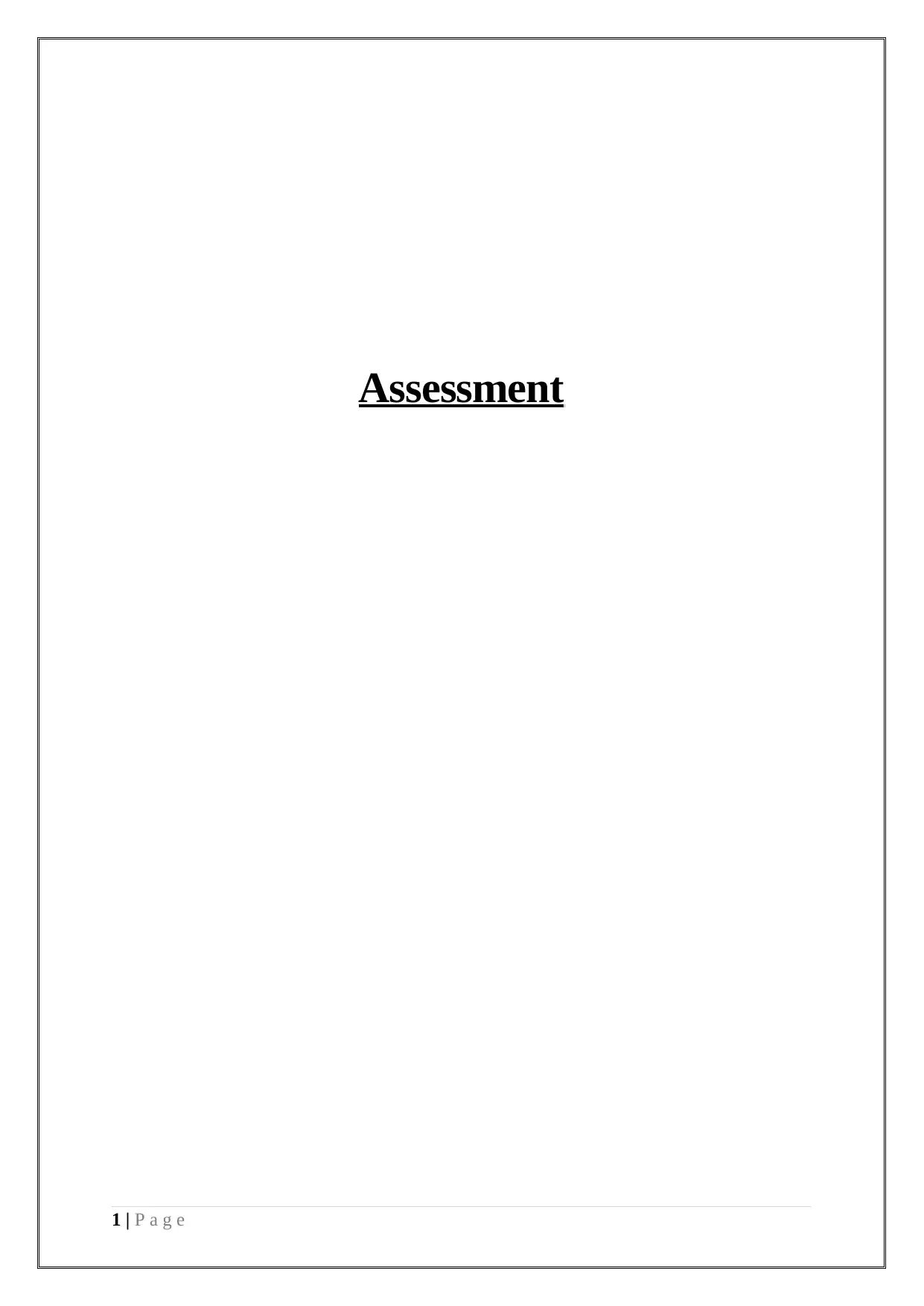
Assessment
1 | P a g e
1 | P a g e
Secure Best Marks with AI Grader
Need help grading? Try our AI Grader for instant feedback on your assignments.
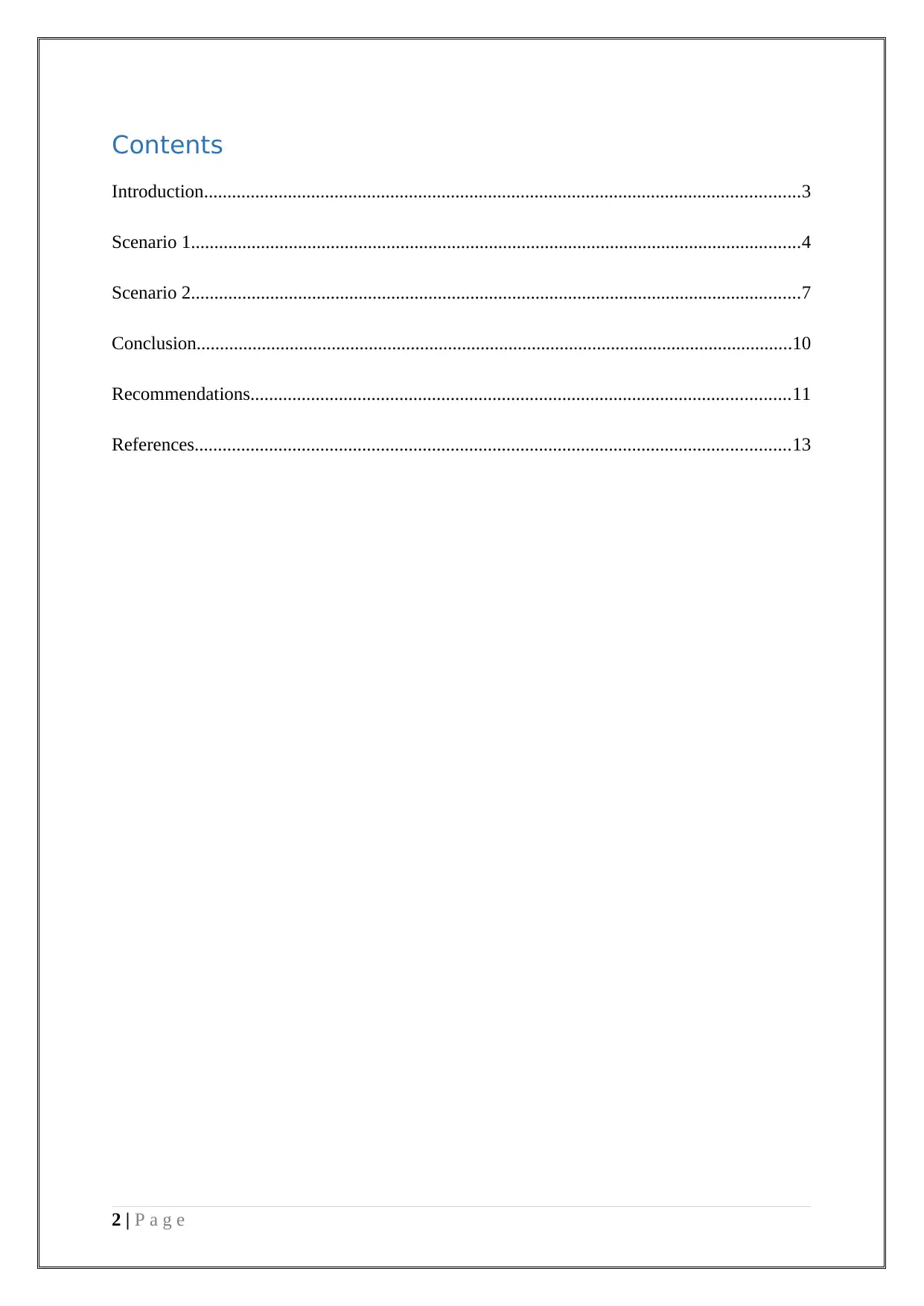
Contents
Introduction................................................................................................................................3
Scenario 1...................................................................................................................................4
Scenario 2...................................................................................................................................7
Conclusion................................................................................................................................10
Recommendations....................................................................................................................11
References................................................................................................................................13
2 | P a g e
Introduction................................................................................................................................3
Scenario 1...................................................................................................................................4
Scenario 2...................................................................................................................................7
Conclusion................................................................................................................................10
Recommendations....................................................................................................................11
References................................................................................................................................13
2 | P a g e
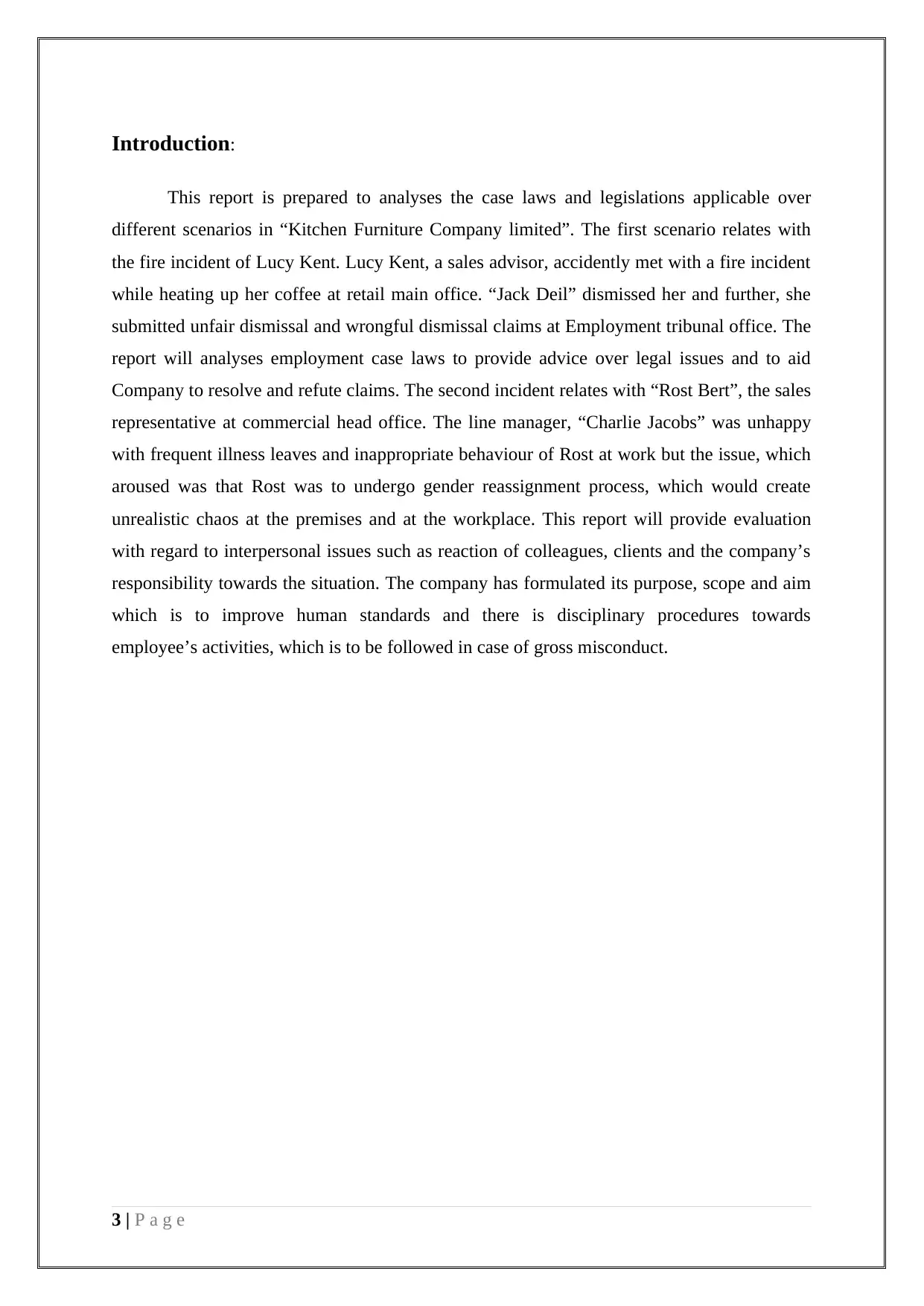
Introduction:
This report is prepared to analyses the case laws and legislations applicable over
different scenarios in “Kitchen Furniture Company limited”. The first scenario relates with
the fire incident of Lucy Kent. Lucy Kent, a sales advisor, accidently met with a fire incident
while heating up her coffee at retail main office. “Jack Deil” dismissed her and further, she
submitted unfair dismissal and wrongful dismissal claims at Employment tribunal office. The
report will analyses employment case laws to provide advice over legal issues and to aid
Company to resolve and refute claims. The second incident relates with “Rost Bert”, the sales
representative at commercial head office. The line manager, “Charlie Jacobs” was unhappy
with frequent illness leaves and inappropriate behaviour of Rost at work but the issue, which
aroused was that Rost was to undergo gender reassignment process, which would create
unrealistic chaos at the premises and at the workplace. This report will provide evaluation
with regard to interpersonal issues such as reaction of colleagues, clients and the company’s
responsibility towards the situation. The company has formulated its purpose, scope and aim
which is to improve human standards and there is disciplinary procedures towards
employee’s activities, which is to be followed in case of gross misconduct.
3 | P a g e
This report is prepared to analyses the case laws and legislations applicable over
different scenarios in “Kitchen Furniture Company limited”. The first scenario relates with
the fire incident of Lucy Kent. Lucy Kent, a sales advisor, accidently met with a fire incident
while heating up her coffee at retail main office. “Jack Deil” dismissed her and further, she
submitted unfair dismissal and wrongful dismissal claims at Employment tribunal office. The
report will analyses employment case laws to provide advice over legal issues and to aid
Company to resolve and refute claims. The second incident relates with “Rost Bert”, the sales
representative at commercial head office. The line manager, “Charlie Jacobs” was unhappy
with frequent illness leaves and inappropriate behaviour of Rost at work but the issue, which
aroused was that Rost was to undergo gender reassignment process, which would create
unrealistic chaos at the premises and at the workplace. This report will provide evaluation
with regard to interpersonal issues such as reaction of colleagues, clients and the company’s
responsibility towards the situation. The company has formulated its purpose, scope and aim
which is to improve human standards and there is disciplinary procedures towards
employee’s activities, which is to be followed in case of gross misconduct.
3 | P a g e
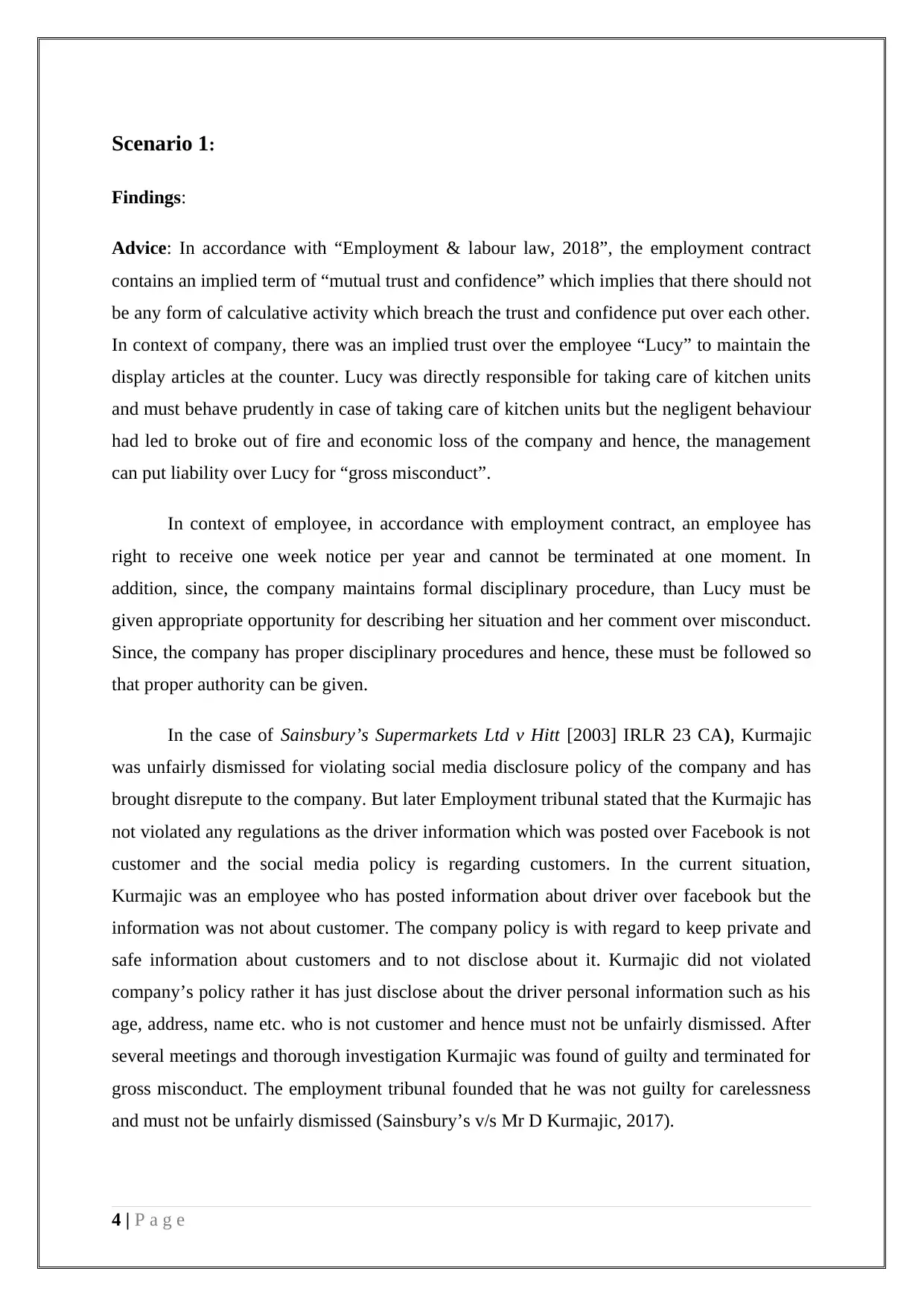
Scenario 1:
Findings:
Advice: In accordance with “Employment & labour law, 2018”, the employment contract
contains an implied term of “mutual trust and confidence” which implies that there should not
be any form of calculative activity which breach the trust and confidence put over each other.
In context of company, there was an implied trust over the employee “Lucy” to maintain the
display articles at the counter. Lucy was directly responsible for taking care of kitchen units
and must behave prudently in case of taking care of kitchen units but the negligent behaviour
had led to broke out of fire and economic loss of the company and hence, the management
can put liability over Lucy for “gross misconduct”.
In context of employee, in accordance with employment contract, an employee has
right to receive one week notice per year and cannot be terminated at one moment. In
addition, since, the company maintains formal disciplinary procedure, than Lucy must be
given appropriate opportunity for describing her situation and her comment over misconduct.
Since, the company has proper disciplinary procedures and hence, these must be followed so
that proper authority can be given.
In the case of Sainsbury’s Supermarkets Ltd v Hitt [2003] IRLR 23 CA), Kurmajic
was unfairly dismissed for violating social media disclosure policy of the company and has
brought disrepute to the company. But later Employment tribunal stated that the Kurmajic has
not violated any regulations as the driver information which was posted over Facebook is not
customer and the social media policy is regarding customers. In the current situation,
Kurmajic was an employee who has posted information about driver over facebook but the
information was not about customer. The company policy is with regard to keep private and
safe information about customers and to not disclose about it. Kurmajic did not violated
company’s policy rather it has just disclose about the driver personal information such as his
age, address, name etc. who is not customer and hence must not be unfairly dismissed. After
several meetings and thorough investigation Kurmajic was found of guilty and terminated for
gross misconduct. The employment tribunal founded that he was not guilty for carelessness
and must not be unfairly dismissed (Sainsbury’s v/s Mr D Kurmajic, 2017).
4 | P a g e
Findings:
Advice: In accordance with “Employment & labour law, 2018”, the employment contract
contains an implied term of “mutual trust and confidence” which implies that there should not
be any form of calculative activity which breach the trust and confidence put over each other.
In context of company, there was an implied trust over the employee “Lucy” to maintain the
display articles at the counter. Lucy was directly responsible for taking care of kitchen units
and must behave prudently in case of taking care of kitchen units but the negligent behaviour
had led to broke out of fire and economic loss of the company and hence, the management
can put liability over Lucy for “gross misconduct”.
In context of employee, in accordance with employment contract, an employee has
right to receive one week notice per year and cannot be terminated at one moment. In
addition, since, the company maintains formal disciplinary procedure, than Lucy must be
given appropriate opportunity for describing her situation and her comment over misconduct.
Since, the company has proper disciplinary procedures and hence, these must be followed so
that proper authority can be given.
In the case of Sainsbury’s Supermarkets Ltd v Hitt [2003] IRLR 23 CA), Kurmajic
was unfairly dismissed for violating social media disclosure policy of the company and has
brought disrepute to the company. But later Employment tribunal stated that the Kurmajic has
not violated any regulations as the driver information which was posted over Facebook is not
customer and the social media policy is regarding customers. In the current situation,
Kurmajic was an employee who has posted information about driver over facebook but the
information was not about customer. The company policy is with regard to keep private and
safe information about customers and to not disclose about it. Kurmajic did not violated
company’s policy rather it has just disclose about the driver personal information such as his
age, address, name etc. who is not customer and hence must not be unfairly dismissed. After
several meetings and thorough investigation Kurmajic was found of guilty and terminated for
gross misconduct. The employment tribunal founded that he was not guilty for carelessness
and must not be unfairly dismissed (Sainsbury’s v/s Mr D Kurmajic, 2017).
4 | P a g e
Secure Best Marks with AI Grader
Need help grading? Try our AI Grader for instant feedback on your assignments.
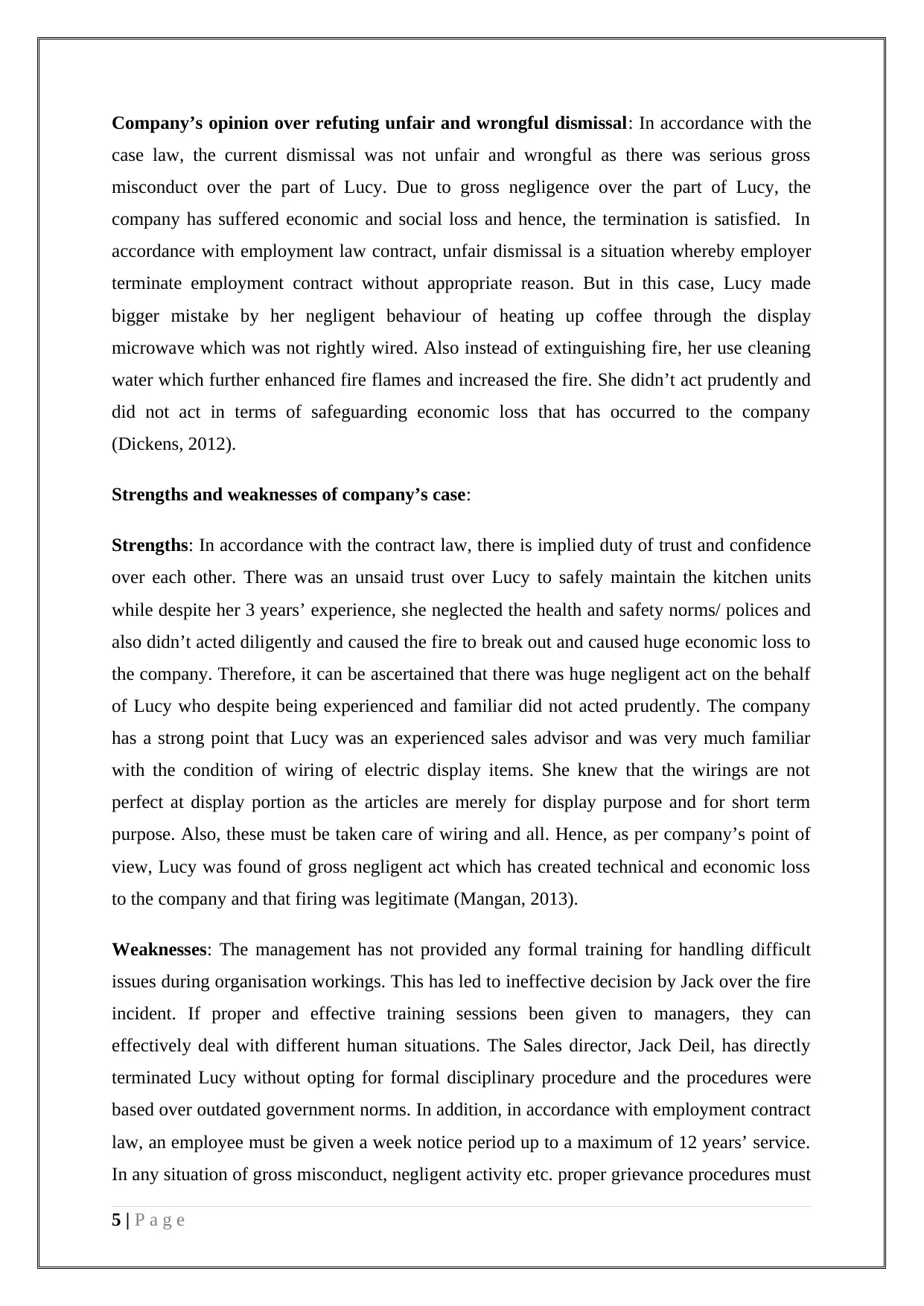
Company’s opinion over refuting unfair and wrongful dismissal: In accordance with the
case law, the current dismissal was not unfair and wrongful as there was serious gross
misconduct over the part of Lucy. Due to gross negligence over the part of Lucy, the
company has suffered economic and social loss and hence, the termination is satisfied. In
accordance with employment law contract, unfair dismissal is a situation whereby employer
terminate employment contract without appropriate reason. But in this case, Lucy made
bigger mistake by her negligent behaviour of heating up coffee through the display
microwave which was not rightly wired. Also instead of extinguishing fire, her use cleaning
water which further enhanced fire flames and increased the fire. She didn’t act prudently and
did not act in terms of safeguarding economic loss that has occurred to the company
(Dickens, 2012).
Strengths and weaknesses of company’s case:
Strengths: In accordance with the contract law, there is implied duty of trust and confidence
over each other. There was an unsaid trust over Lucy to safely maintain the kitchen units
while despite her 3 years’ experience, she neglected the health and safety norms/ polices and
also didn’t acted diligently and caused the fire to break out and caused huge economic loss to
the company. Therefore, it can be ascertained that there was huge negligent act on the behalf
of Lucy who despite being experienced and familiar did not acted prudently. The company
has a strong point that Lucy was an experienced sales advisor and was very much familiar
with the condition of wiring of electric display items. She knew that the wirings are not
perfect at display portion as the articles are merely for display purpose and for short term
purpose. Also, these must be taken care of wiring and all. Hence, as per company’s point of
view, Lucy was found of gross negligent act which has created technical and economic loss
to the company and that firing was legitimate (Mangan, 2013).
Weaknesses: The management has not provided any formal training for handling difficult
issues during organisation workings. This has led to ineffective decision by Jack over the fire
incident. If proper and effective training sessions been given to managers, they can
effectively deal with different human situations. The Sales director, Jack Deil, has directly
terminated Lucy without opting for formal disciplinary procedure and the procedures were
based over outdated government norms. In addition, in accordance with employment contract
law, an employee must be given a week notice period up to a maximum of 12 years’ service.
In any situation of gross misconduct, negligent activity etc. proper grievance procedures must
5 | P a g e
case law, the current dismissal was not unfair and wrongful as there was serious gross
misconduct over the part of Lucy. Due to gross negligence over the part of Lucy, the
company has suffered economic and social loss and hence, the termination is satisfied. In
accordance with employment law contract, unfair dismissal is a situation whereby employer
terminate employment contract without appropriate reason. But in this case, Lucy made
bigger mistake by her negligent behaviour of heating up coffee through the display
microwave which was not rightly wired. Also instead of extinguishing fire, her use cleaning
water which further enhanced fire flames and increased the fire. She didn’t act prudently and
did not act in terms of safeguarding economic loss that has occurred to the company
(Dickens, 2012).
Strengths and weaknesses of company’s case:
Strengths: In accordance with the contract law, there is implied duty of trust and confidence
over each other. There was an unsaid trust over Lucy to safely maintain the kitchen units
while despite her 3 years’ experience, she neglected the health and safety norms/ polices and
also didn’t acted diligently and caused the fire to break out and caused huge economic loss to
the company. Therefore, it can be ascertained that there was huge negligent act on the behalf
of Lucy who despite being experienced and familiar did not acted prudently. The company
has a strong point that Lucy was an experienced sales advisor and was very much familiar
with the condition of wiring of electric display items. She knew that the wirings are not
perfect at display portion as the articles are merely for display purpose and for short term
purpose. Also, these must be taken care of wiring and all. Hence, as per company’s point of
view, Lucy was found of gross negligent act which has created technical and economic loss
to the company and that firing was legitimate (Mangan, 2013).
Weaknesses: The management has not provided any formal training for handling difficult
issues during organisation workings. This has led to ineffective decision by Jack over the fire
incident. If proper and effective training sessions been given to managers, they can
effectively deal with different human situations. The Sales director, Jack Deil, has directly
terminated Lucy without opting for formal disciplinary procedure and the procedures were
based over outdated government norms. In addition, in accordance with employment contract
law, an employee must be given a week notice period up to a maximum of 12 years’ service.
In any situation of gross misconduct, negligent activity etc. proper grievance procedures must
5 | P a g e
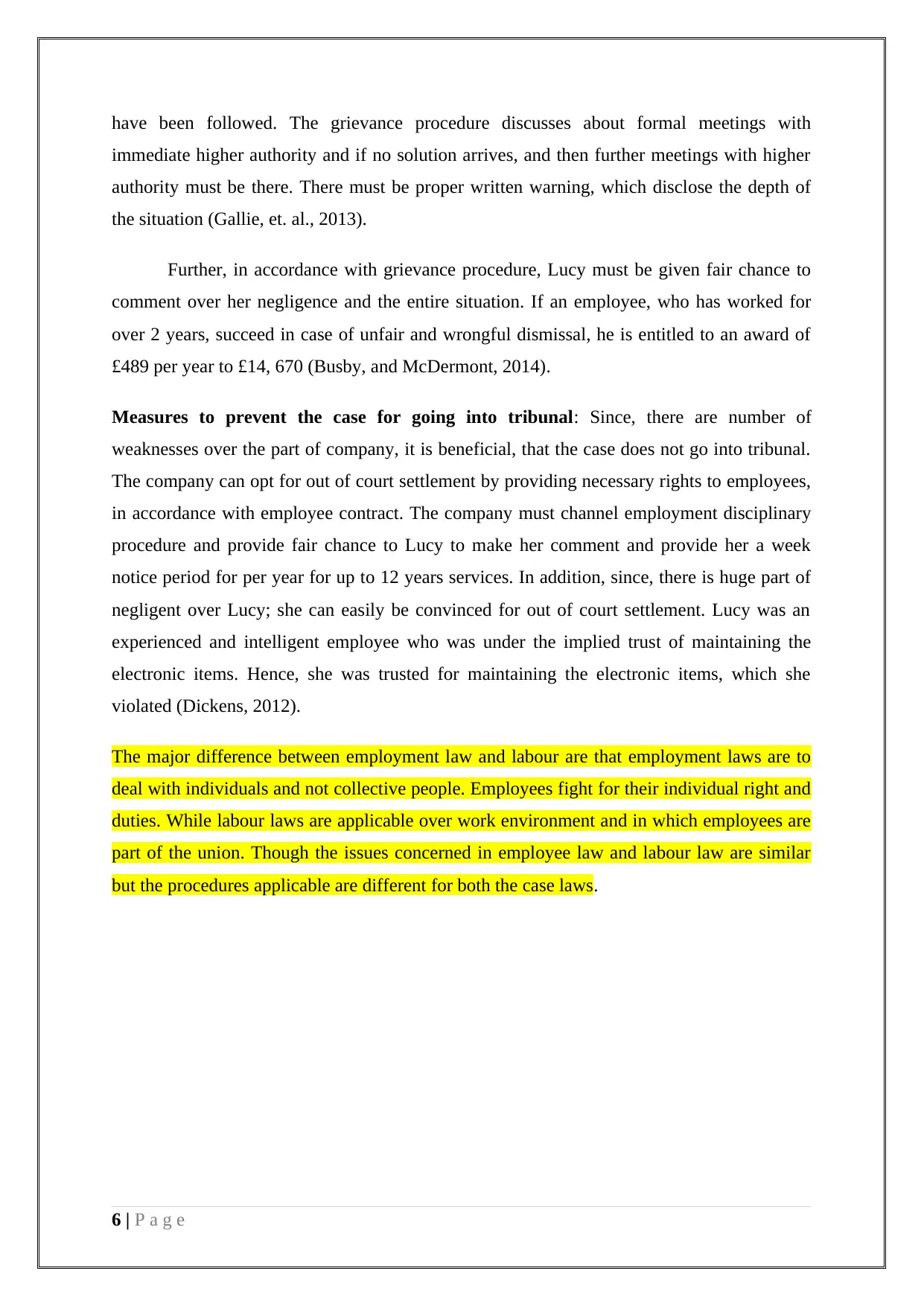
have been followed. The grievance procedure discusses about formal meetings with
immediate higher authority and if no solution arrives, and then further meetings with higher
authority must be there. There must be proper written warning, which disclose the depth of
the situation (Gallie, et. al., 2013).
Further, in accordance with grievance procedure, Lucy must be given fair chance to
comment over her negligence and the entire situation. If an employee, who has worked for
over 2 years, succeed in case of unfair and wrongful dismissal, he is entitled to an award of
£489 per year to £14, 670 (Busby, and McDermont, 2014).
Measures to prevent the case for going into tribunal: Since, there are number of
weaknesses over the part of company, it is beneficial, that the case does not go into tribunal.
The company can opt for out of court settlement by providing necessary rights to employees,
in accordance with employee contract. The company must channel employment disciplinary
procedure and provide fair chance to Lucy to make her comment and provide her a week
notice period for per year for up to 12 years services. In addition, since, there is huge part of
negligent over Lucy; she can easily be convinced for out of court settlement. Lucy was an
experienced and intelligent employee who was under the implied trust of maintaining the
electronic items. Hence, she was trusted for maintaining the electronic items, which she
violated (Dickens, 2012).
The major difference between employment law and labour are that employment laws are to
deal with individuals and not collective people. Employees fight for their individual right and
duties. While labour laws are applicable over work environment and in which employees are
part of the union. Though the issues concerned in employee law and labour law are similar
but the procedures applicable are different for both the case laws.
6 | P a g e
immediate higher authority and if no solution arrives, and then further meetings with higher
authority must be there. There must be proper written warning, which disclose the depth of
the situation (Gallie, et. al., 2013).
Further, in accordance with grievance procedure, Lucy must be given fair chance to
comment over her negligence and the entire situation. If an employee, who has worked for
over 2 years, succeed in case of unfair and wrongful dismissal, he is entitled to an award of
£489 per year to £14, 670 (Busby, and McDermont, 2014).
Measures to prevent the case for going into tribunal: Since, there are number of
weaknesses over the part of company, it is beneficial, that the case does not go into tribunal.
The company can opt for out of court settlement by providing necessary rights to employees,
in accordance with employee contract. The company must channel employment disciplinary
procedure and provide fair chance to Lucy to make her comment and provide her a week
notice period for per year for up to 12 years services. In addition, since, there is huge part of
negligent over Lucy; she can easily be convinced for out of court settlement. Lucy was an
experienced and intelligent employee who was under the implied trust of maintaining the
electronic items. Hence, she was trusted for maintaining the electronic items, which she
violated (Dickens, 2012).
The major difference between employment law and labour are that employment laws are to
deal with individuals and not collective people. Employees fight for their individual right and
duties. While labour laws are applicable over work environment and in which employees are
part of the union. Though the issues concerned in employee law and labour law are similar
but the procedures applicable are different for both the case laws.
6 | P a g e
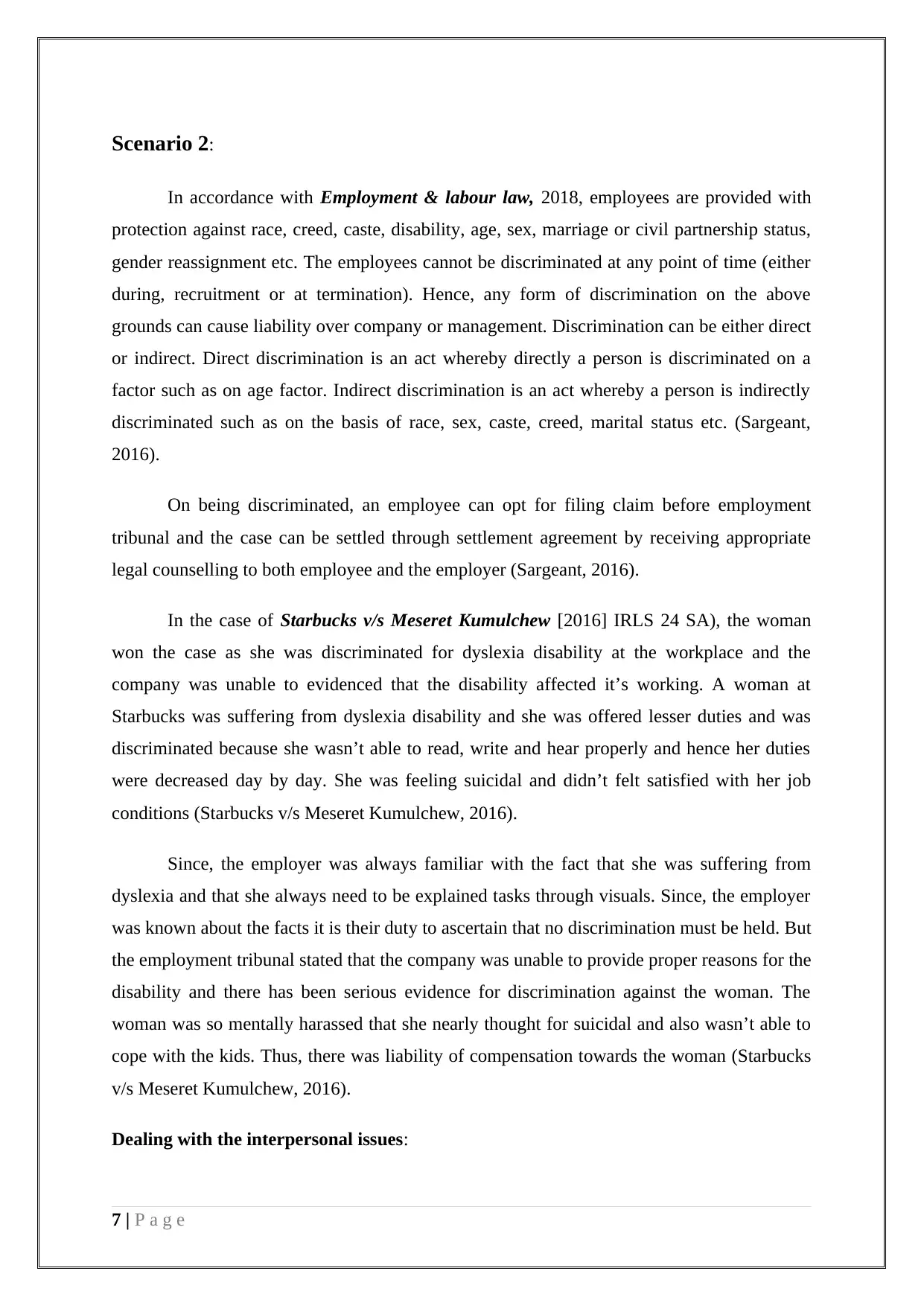
Scenario 2:
In accordance with Employment & labour law, 2018, employees are provided with
protection against race, creed, caste, disability, age, sex, marriage or civil partnership status,
gender reassignment etc. The employees cannot be discriminated at any point of time (either
during, recruitment or at termination). Hence, any form of discrimination on the above
grounds can cause liability over company or management. Discrimination can be either direct
or indirect. Direct discrimination is an act whereby directly a person is discriminated on a
factor such as on age factor. Indirect discrimination is an act whereby a person is indirectly
discriminated such as on the basis of race, sex, caste, creed, marital status etc. (Sargeant,
2016).
On being discriminated, an employee can opt for filing claim before employment
tribunal and the case can be settled through settlement agreement by receiving appropriate
legal counselling to both employee and the employer (Sargeant, 2016).
In the case of Starbucks v/s Meseret Kumulchew [2016] IRLS 24 SA), the woman
won the case as she was discriminated for dyslexia disability at the workplace and the
company was unable to evidenced that the disability affected it’s working. A woman at
Starbucks was suffering from dyslexia disability and she was offered lesser duties and was
discriminated because she wasn’t able to read, write and hear properly and hence her duties
were decreased day by day. She was feeling suicidal and didn’t felt satisfied with her job
conditions (Starbucks v/s Meseret Kumulchew, 2016).
Since, the employer was always familiar with the fact that she was suffering from
dyslexia and that she always need to be explained tasks through visuals. Since, the employer
was known about the facts it is their duty to ascertain that no discrimination must be held. But
the employment tribunal stated that the company was unable to provide proper reasons for the
disability and there has been serious evidence for discrimination against the woman. The
woman was so mentally harassed that she nearly thought for suicidal and also wasn’t able to
cope with the kids. Thus, there was liability of compensation towards the woman (Starbucks
v/s Meseret Kumulchew, 2016).
Dealing with the interpersonal issues:
7 | P a g e
In accordance with Employment & labour law, 2018, employees are provided with
protection against race, creed, caste, disability, age, sex, marriage or civil partnership status,
gender reassignment etc. The employees cannot be discriminated at any point of time (either
during, recruitment or at termination). Hence, any form of discrimination on the above
grounds can cause liability over company or management. Discrimination can be either direct
or indirect. Direct discrimination is an act whereby directly a person is discriminated on a
factor such as on age factor. Indirect discrimination is an act whereby a person is indirectly
discriminated such as on the basis of race, sex, caste, creed, marital status etc. (Sargeant,
2016).
On being discriminated, an employee can opt for filing claim before employment
tribunal and the case can be settled through settlement agreement by receiving appropriate
legal counselling to both employee and the employer (Sargeant, 2016).
In the case of Starbucks v/s Meseret Kumulchew [2016] IRLS 24 SA), the woman
won the case as she was discriminated for dyslexia disability at the workplace and the
company was unable to evidenced that the disability affected it’s working. A woman at
Starbucks was suffering from dyslexia disability and she was offered lesser duties and was
discriminated because she wasn’t able to read, write and hear properly and hence her duties
were decreased day by day. She was feeling suicidal and didn’t felt satisfied with her job
conditions (Starbucks v/s Meseret Kumulchew, 2016).
Since, the employer was always familiar with the fact that she was suffering from
dyslexia and that she always need to be explained tasks through visuals. Since, the employer
was known about the facts it is their duty to ascertain that no discrimination must be held. But
the employment tribunal stated that the company was unable to provide proper reasons for the
disability and there has been serious evidence for discrimination against the woman. The
woman was so mentally harassed that she nearly thought for suicidal and also wasn’t able to
cope with the kids. Thus, there was liability of compensation towards the woman (Starbucks
v/s Meseret Kumulchew, 2016).
Dealing with the interpersonal issues:
7 | P a g e
Paraphrase This Document
Need a fresh take? Get an instant paraphrase of this document with our AI Paraphraser
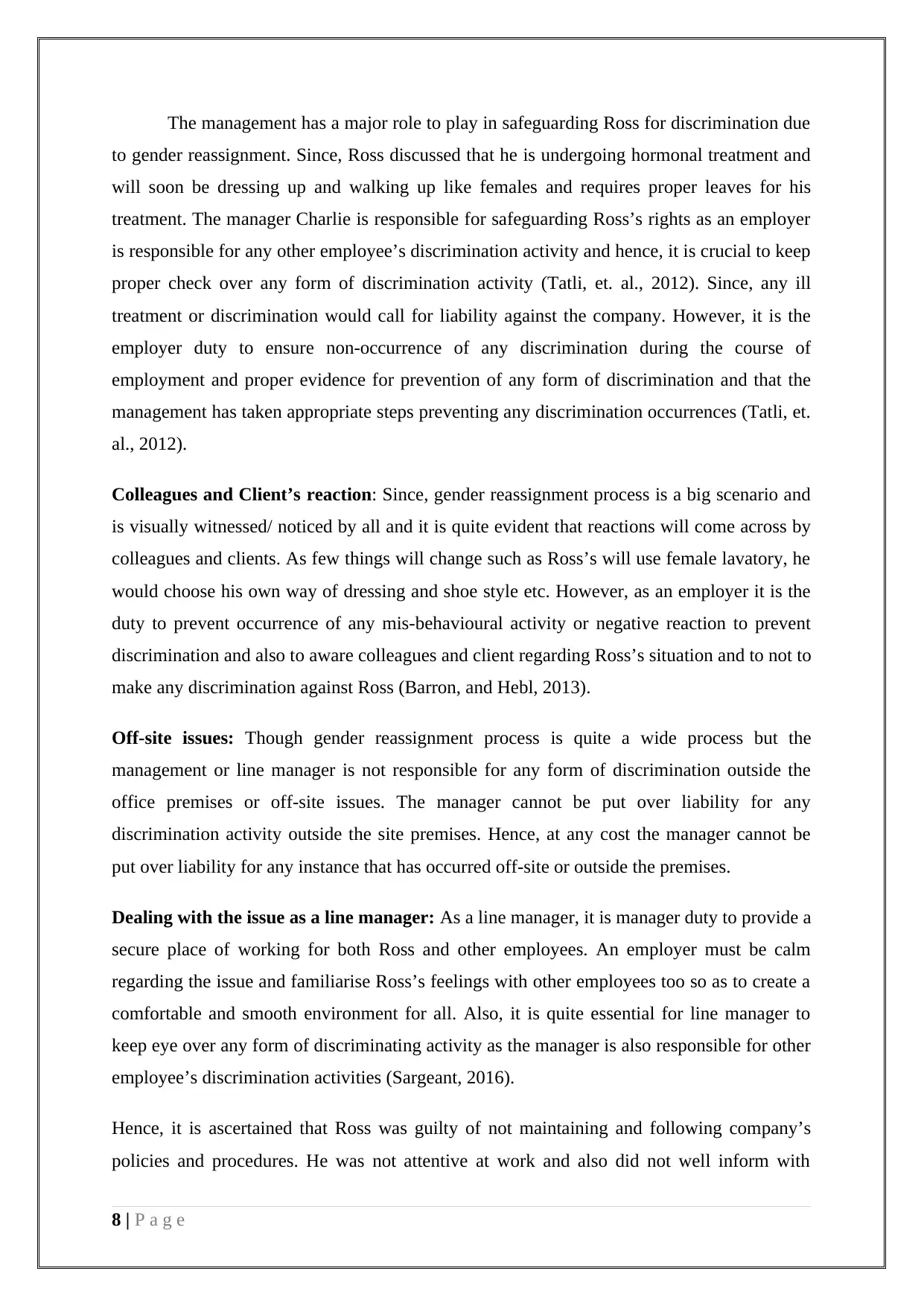
The management has a major role to play in safeguarding Ross for discrimination due
to gender reassignment. Since, Ross discussed that he is undergoing hormonal treatment and
will soon be dressing up and walking up like females and requires proper leaves for his
treatment. The manager Charlie is responsible for safeguarding Ross’s rights as an employer
is responsible for any other employee’s discrimination activity and hence, it is crucial to keep
proper check over any form of discrimination activity (Tatli, et. al., 2012). Since, any ill
treatment or discrimination would call for liability against the company. However, it is the
employer duty to ensure non-occurrence of any discrimination during the course of
employment and proper evidence for prevention of any form of discrimination and that the
management has taken appropriate steps preventing any discrimination occurrences (Tatli, et.
al., 2012).
Colleagues and Client’s reaction: Since, gender reassignment process is a big scenario and
is visually witnessed/ noticed by all and it is quite evident that reactions will come across by
colleagues and clients. As few things will change such as Ross’s will use female lavatory, he
would choose his own way of dressing and shoe style etc. However, as an employer it is the
duty to prevent occurrence of any mis-behavioural activity or negative reaction to prevent
discrimination and also to aware colleagues and client regarding Ross’s situation and to not to
make any discrimination against Ross (Barron, and Hebl, 2013).
Off-site issues: Though gender reassignment process is quite a wide process but the
management or line manager is not responsible for any form of discrimination outside the
office premises or off-site issues. The manager cannot be put over liability for any
discrimination activity outside the site premises. Hence, at any cost the manager cannot be
put over liability for any instance that has occurred off-site or outside the premises.
Dealing with the issue as a line manager: As a line manager, it is manager duty to provide a
secure place of working for both Ross and other employees. An employer must be calm
regarding the issue and familiarise Ross’s feelings with other employees too so as to create a
comfortable and smooth environment for all. Also, it is quite essential for line manager to
keep eye over any form of discriminating activity as the manager is also responsible for other
employee’s discrimination activities (Sargeant, 2016).
Hence, it is ascertained that Ross was guilty of not maintaining and following company’s
policies and procedures. He was not attentive at work and also did not well inform with
8 | P a g e
to gender reassignment. Since, Ross discussed that he is undergoing hormonal treatment and
will soon be dressing up and walking up like females and requires proper leaves for his
treatment. The manager Charlie is responsible for safeguarding Ross’s rights as an employer
is responsible for any other employee’s discrimination activity and hence, it is crucial to keep
proper check over any form of discrimination activity (Tatli, et. al., 2012). Since, any ill
treatment or discrimination would call for liability against the company. However, it is the
employer duty to ensure non-occurrence of any discrimination during the course of
employment and proper evidence for prevention of any form of discrimination and that the
management has taken appropriate steps preventing any discrimination occurrences (Tatli, et.
al., 2012).
Colleagues and Client’s reaction: Since, gender reassignment process is a big scenario and
is visually witnessed/ noticed by all and it is quite evident that reactions will come across by
colleagues and clients. As few things will change such as Ross’s will use female lavatory, he
would choose his own way of dressing and shoe style etc. However, as an employer it is the
duty to prevent occurrence of any mis-behavioural activity or negative reaction to prevent
discrimination and also to aware colleagues and client regarding Ross’s situation and to not to
make any discrimination against Ross (Barron, and Hebl, 2013).
Off-site issues: Though gender reassignment process is quite a wide process but the
management or line manager is not responsible for any form of discrimination outside the
office premises or off-site issues. The manager cannot be put over liability for any
discrimination activity outside the site premises. Hence, at any cost the manager cannot be
put over liability for any instance that has occurred off-site or outside the premises.
Dealing with the issue as a line manager: As a line manager, it is manager duty to provide a
secure place of working for both Ross and other employees. An employer must be calm
regarding the issue and familiarise Ross’s feelings with other employees too so as to create a
comfortable and smooth environment for all. Also, it is quite essential for line manager to
keep eye over any form of discriminating activity as the manager is also responsible for other
employee’s discrimination activities (Sargeant, 2016).
Hence, it is ascertained that Ross was guilty of not maintaining and following company’s
policies and procedures. He was not attentive at work and also did not well inform with
8 | P a g e
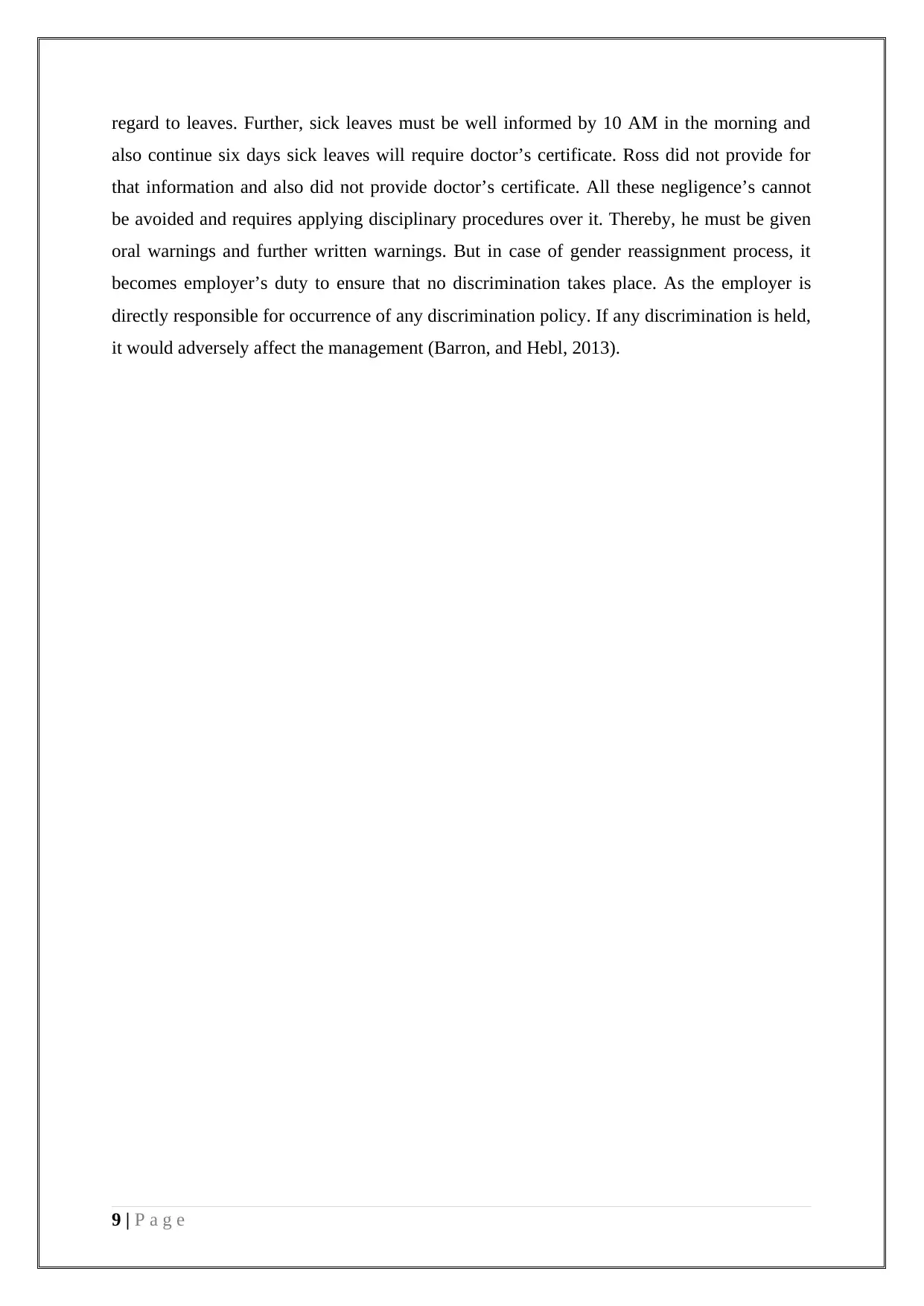
regard to leaves. Further, sick leaves must be well informed by 10 AM in the morning and
also continue six days sick leaves will require doctor’s certificate. Ross did not provide for
that information and also did not provide doctor’s certificate. All these negligence’s cannot
be avoided and requires applying disciplinary procedures over it. Thereby, he must be given
oral warnings and further written warnings. But in case of gender reassignment process, it
becomes employer’s duty to ensure that no discrimination takes place. As the employer is
directly responsible for occurrence of any discrimination policy. If any discrimination is held,
it would adversely affect the management (Barron, and Hebl, 2013).
9 | P a g e
also continue six days sick leaves will require doctor’s certificate. Ross did not provide for
that information and also did not provide doctor’s certificate. All these negligence’s cannot
be avoided and requires applying disciplinary procedures over it. Thereby, he must be given
oral warnings and further written warnings. But in case of gender reassignment process, it
becomes employer’s duty to ensure that no discrimination takes place. As the employer is
directly responsible for occurrence of any discrimination policy. If any discrimination is held,
it would adversely affect the management (Barron, and Hebl, 2013).
9 | P a g e
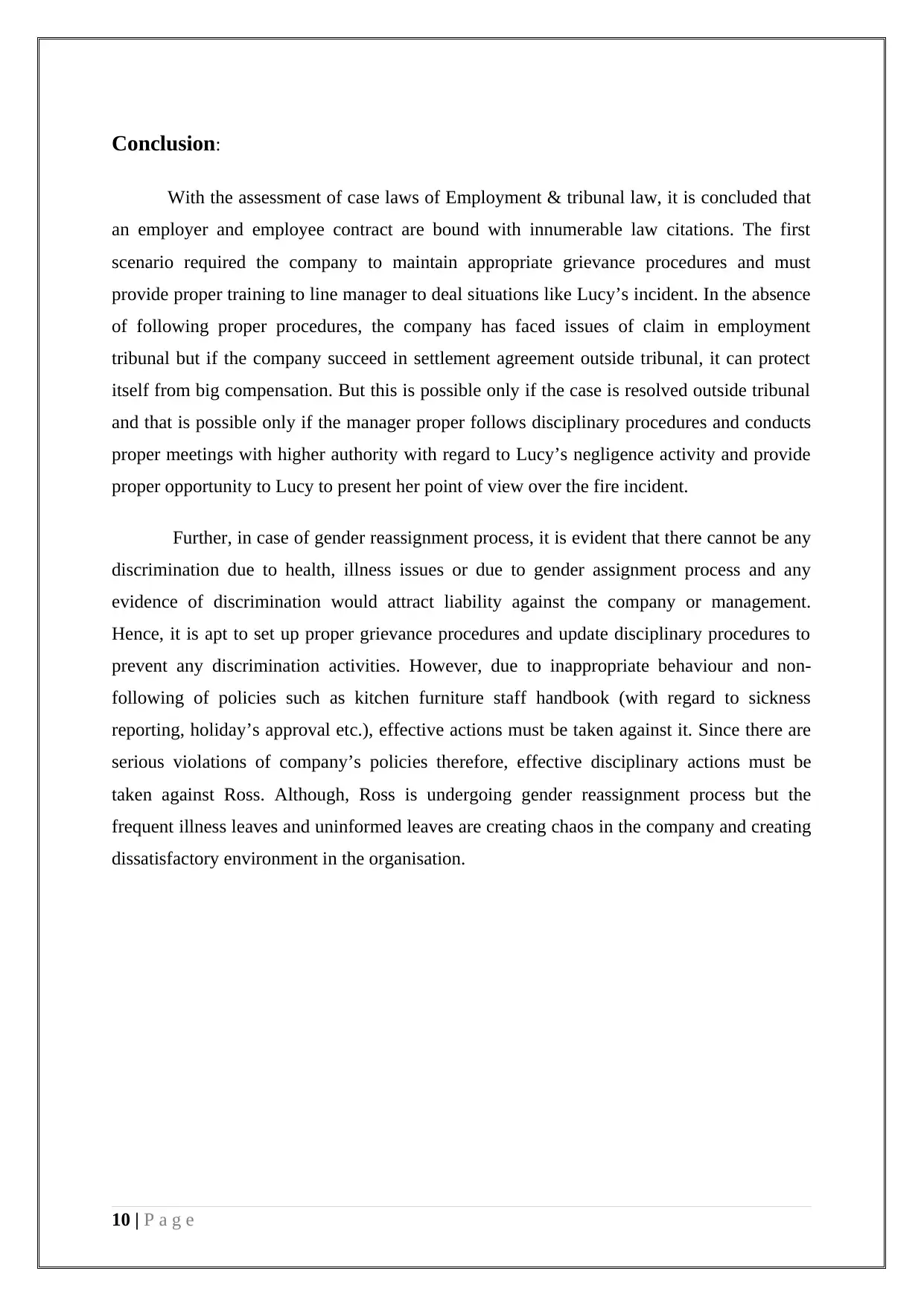
Conclusion:
With the assessment of case laws of Employment & tribunal law, it is concluded that
an employer and employee contract are bound with innumerable law citations. The first
scenario required the company to maintain appropriate grievance procedures and must
provide proper training to line manager to deal situations like Lucy’s incident. In the absence
of following proper procedures, the company has faced issues of claim in employment
tribunal but if the company succeed in settlement agreement outside tribunal, it can protect
itself from big compensation. But this is possible only if the case is resolved outside tribunal
and that is possible only if the manager proper follows disciplinary procedures and conducts
proper meetings with higher authority with regard to Lucy’s negligence activity and provide
proper opportunity to Lucy to present her point of view over the fire incident.
Further, in case of gender reassignment process, it is evident that there cannot be any
discrimination due to health, illness issues or due to gender assignment process and any
evidence of discrimination would attract liability against the company or management.
Hence, it is apt to set up proper grievance procedures and update disciplinary procedures to
prevent any discrimination activities. However, due to inappropriate behaviour and non-
following of policies such as kitchen furniture staff handbook (with regard to sickness
reporting, holiday’s approval etc.), effective actions must be taken against it. Since there are
serious violations of company’s policies therefore, effective disciplinary actions must be
taken against Ross. Although, Ross is undergoing gender reassignment process but the
frequent illness leaves and uninformed leaves are creating chaos in the company and creating
dissatisfactory environment in the organisation.
10 | P a g e
With the assessment of case laws of Employment & tribunal law, it is concluded that
an employer and employee contract are bound with innumerable law citations. The first
scenario required the company to maintain appropriate grievance procedures and must
provide proper training to line manager to deal situations like Lucy’s incident. In the absence
of following proper procedures, the company has faced issues of claim in employment
tribunal but if the company succeed in settlement agreement outside tribunal, it can protect
itself from big compensation. But this is possible only if the case is resolved outside tribunal
and that is possible only if the manager proper follows disciplinary procedures and conducts
proper meetings with higher authority with regard to Lucy’s negligence activity and provide
proper opportunity to Lucy to present her point of view over the fire incident.
Further, in case of gender reassignment process, it is evident that there cannot be any
discrimination due to health, illness issues or due to gender assignment process and any
evidence of discrimination would attract liability against the company or management.
Hence, it is apt to set up proper grievance procedures and update disciplinary procedures to
prevent any discrimination activities. However, due to inappropriate behaviour and non-
following of policies such as kitchen furniture staff handbook (with regard to sickness
reporting, holiday’s approval etc.), effective actions must be taken against it. Since there are
serious violations of company’s policies therefore, effective disciplinary actions must be
taken against Ross. Although, Ross is undergoing gender reassignment process but the
frequent illness leaves and uninformed leaves are creating chaos in the company and creating
dissatisfactory environment in the organisation.
10 | P a g e
Secure Best Marks with AI Grader
Need help grading? Try our AI Grader for instant feedback on your assignments.
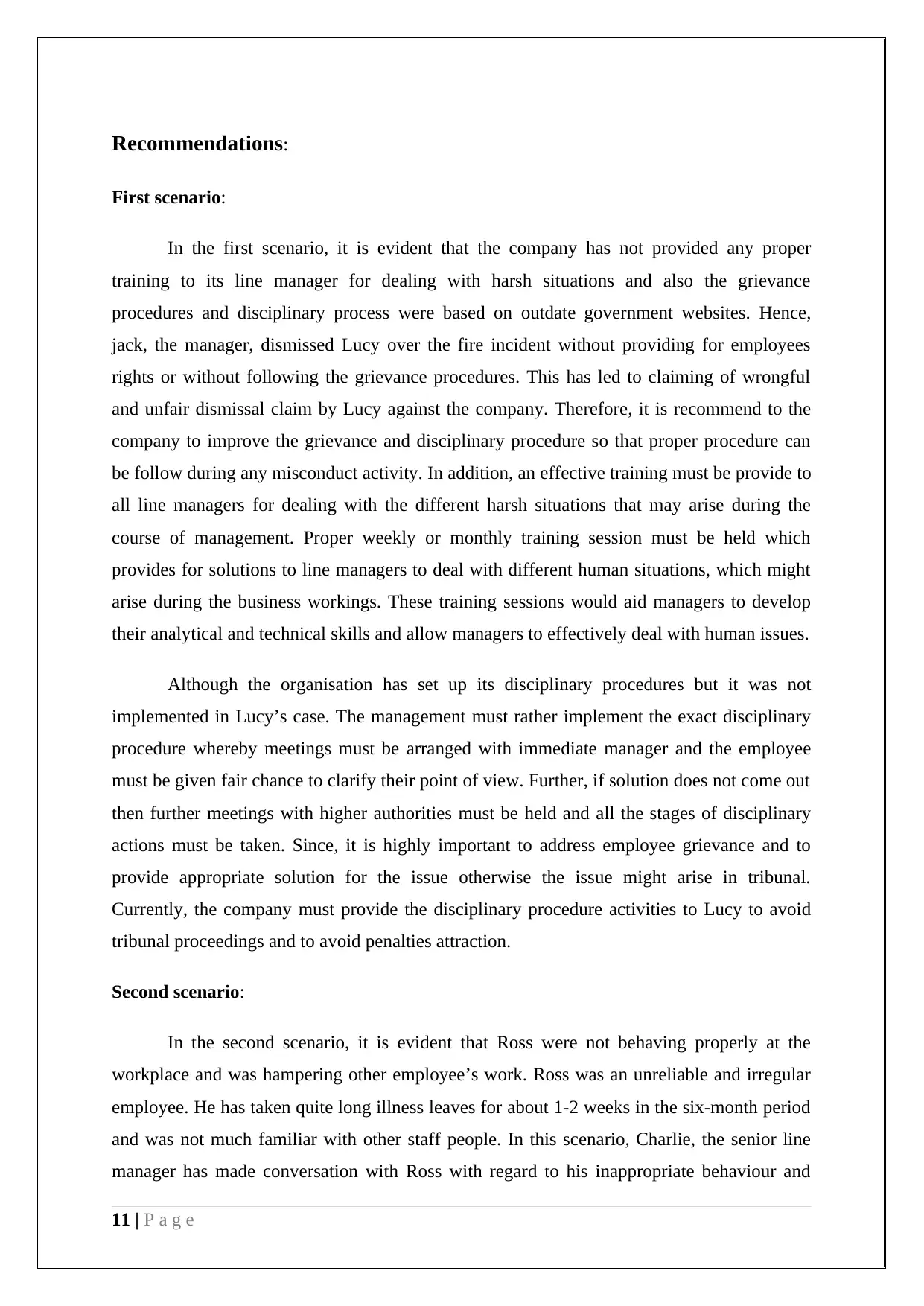
Recommendations:
First scenario:
In the first scenario, it is evident that the company has not provided any proper
training to its line manager for dealing with harsh situations and also the grievance
procedures and disciplinary process were based on outdate government websites. Hence,
jack, the manager, dismissed Lucy over the fire incident without providing for employees
rights or without following the grievance procedures. This has led to claiming of wrongful
and unfair dismissal claim by Lucy against the company. Therefore, it is recommend to the
company to improve the grievance and disciplinary procedure so that proper procedure can
be follow during any misconduct activity. In addition, an effective training must be provide to
all line managers for dealing with the different harsh situations that may arise during the
course of management. Proper weekly or monthly training session must be held which
provides for solutions to line managers to deal with different human situations, which might
arise during the business workings. These training sessions would aid managers to develop
their analytical and technical skills and allow managers to effectively deal with human issues.
Although the organisation has set up its disciplinary procedures but it was not
implemented in Lucy’s case. The management must rather implement the exact disciplinary
procedure whereby meetings must be arranged with immediate manager and the employee
must be given fair chance to clarify their point of view. Further, if solution does not come out
then further meetings with higher authorities must be held and all the stages of disciplinary
actions must be taken. Since, it is highly important to address employee grievance and to
provide appropriate solution for the issue otherwise the issue might arise in tribunal.
Currently, the company must provide the disciplinary procedure activities to Lucy to avoid
tribunal proceedings and to avoid penalties attraction.
Second scenario:
In the second scenario, it is evident that Ross were not behaving properly at the
workplace and was hampering other employee’s work. Ross was an unreliable and irregular
employee. He has taken quite long illness leaves for about 1-2 weeks in the six-month period
and was not much familiar with other staff people. In this scenario, Charlie, the senior line
manager has made conversation with Ross with regard to his inappropriate behaviour and
11 | P a g e
First scenario:
In the first scenario, it is evident that the company has not provided any proper
training to its line manager for dealing with harsh situations and also the grievance
procedures and disciplinary process were based on outdate government websites. Hence,
jack, the manager, dismissed Lucy over the fire incident without providing for employees
rights or without following the grievance procedures. This has led to claiming of wrongful
and unfair dismissal claim by Lucy against the company. Therefore, it is recommend to the
company to improve the grievance and disciplinary procedure so that proper procedure can
be follow during any misconduct activity. In addition, an effective training must be provide to
all line managers for dealing with the different harsh situations that may arise during the
course of management. Proper weekly or monthly training session must be held which
provides for solutions to line managers to deal with different human situations, which might
arise during the business workings. These training sessions would aid managers to develop
their analytical and technical skills and allow managers to effectively deal with human issues.
Although the organisation has set up its disciplinary procedures but it was not
implemented in Lucy’s case. The management must rather implement the exact disciplinary
procedure whereby meetings must be arranged with immediate manager and the employee
must be given fair chance to clarify their point of view. Further, if solution does not come out
then further meetings with higher authorities must be held and all the stages of disciplinary
actions must be taken. Since, it is highly important to address employee grievance and to
provide appropriate solution for the issue otherwise the issue might arise in tribunal.
Currently, the company must provide the disciplinary procedure activities to Lucy to avoid
tribunal proceedings and to avoid penalties attraction.
Second scenario:
In the second scenario, it is evident that Ross were not behaving properly at the
workplace and was hampering other employee’s work. Ross was an unreliable and irregular
employee. He has taken quite long illness leaves for about 1-2 weeks in the six-month period
and was not much familiar with other staff people. In this scenario, Charlie, the senior line
manager has made conversation with Ross with regard to his inappropriate behaviour and
11 | P a g e
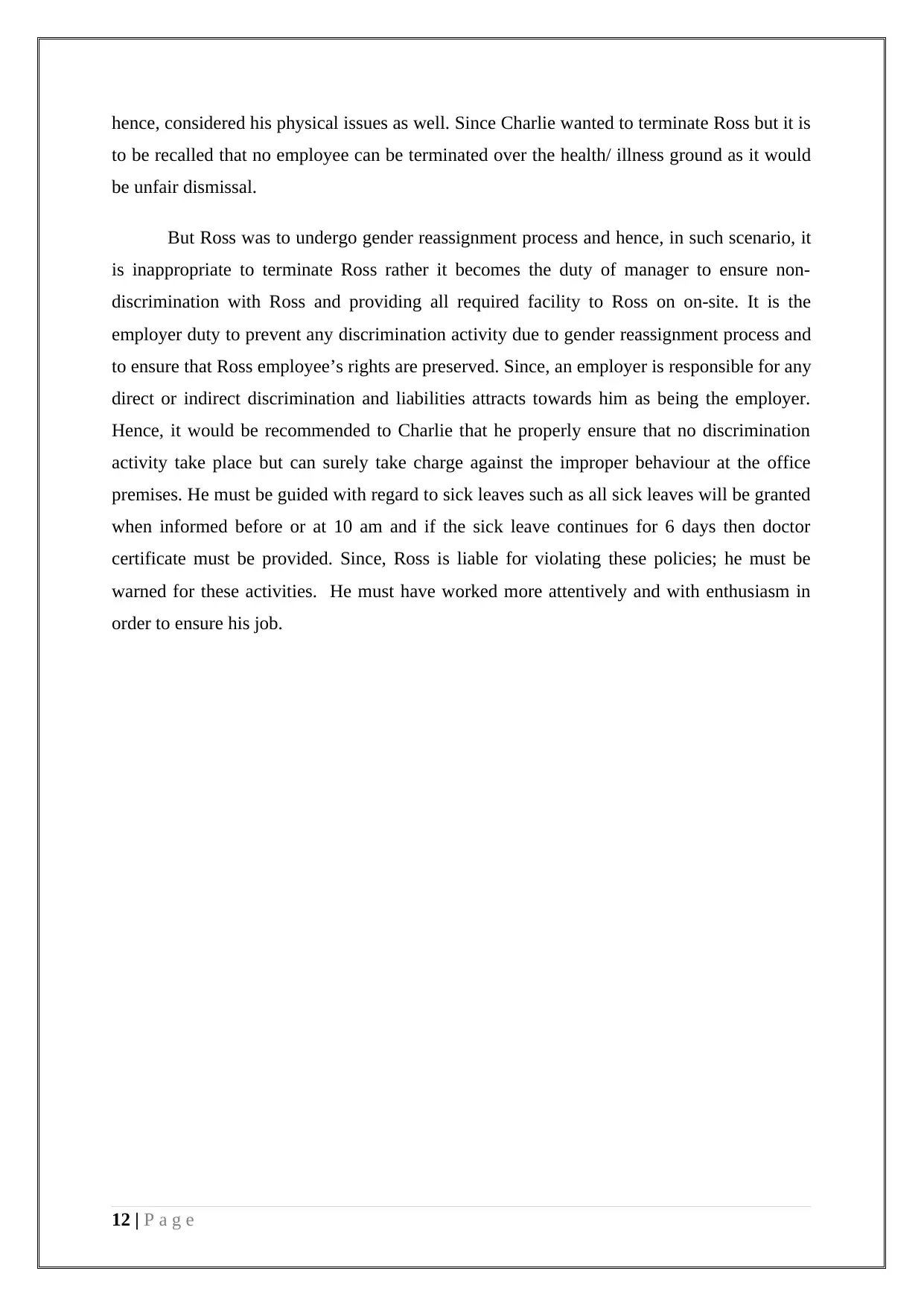
hence, considered his physical issues as well. Since Charlie wanted to terminate Ross but it is
to be recalled that no employee can be terminated over the health/ illness ground as it would
be unfair dismissal.
But Ross was to undergo gender reassignment process and hence, in such scenario, it
is inappropriate to terminate Ross rather it becomes the duty of manager to ensure non-
discrimination with Ross and providing all required facility to Ross on on-site. It is the
employer duty to prevent any discrimination activity due to gender reassignment process and
to ensure that Ross employee’s rights are preserved. Since, an employer is responsible for any
direct or indirect discrimination and liabilities attracts towards him as being the employer.
Hence, it would be recommended to Charlie that he properly ensure that no discrimination
activity take place but can surely take charge against the improper behaviour at the office
premises. He must be guided with regard to sick leaves such as all sick leaves will be granted
when informed before or at 10 am and if the sick leave continues for 6 days then doctor
certificate must be provided. Since, Ross is liable for violating these policies; he must be
warned for these activities. He must have worked more attentively and with enthusiasm in
order to ensure his job.
12 | P a g e
to be recalled that no employee can be terminated over the health/ illness ground as it would
be unfair dismissal.
But Ross was to undergo gender reassignment process and hence, in such scenario, it
is inappropriate to terminate Ross rather it becomes the duty of manager to ensure non-
discrimination with Ross and providing all required facility to Ross on on-site. It is the
employer duty to prevent any discrimination activity due to gender reassignment process and
to ensure that Ross employee’s rights are preserved. Since, an employer is responsible for any
direct or indirect discrimination and liabilities attracts towards him as being the employer.
Hence, it would be recommended to Charlie that he properly ensure that no discrimination
activity take place but can surely take charge against the improper behaviour at the office
premises. He must be guided with regard to sick leaves such as all sick leaves will be granted
when informed before or at 10 am and if the sick leave continues for 6 days then doctor
certificate must be provided. Since, Ross is liable for violating these policies; he must be
warned for these activities. He must have worked more attentively and with enthusiasm in
order to ensure his job.
12 | P a g e
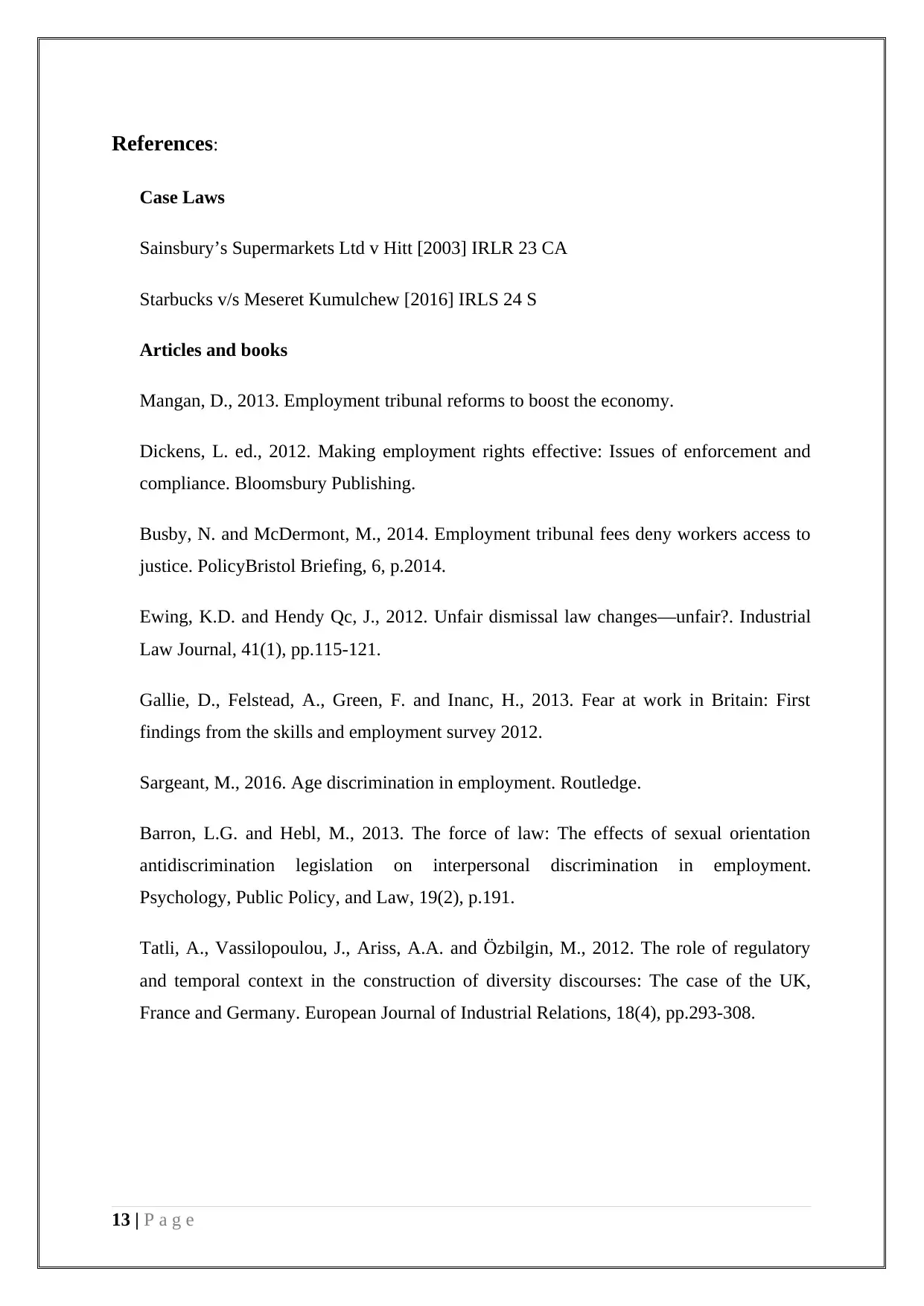
References:
Case Laws
Sainsbury’s Supermarkets Ltd v Hitt [2003] IRLR 23 CA
Starbucks v/s Meseret Kumulchew [2016] IRLS 24 S
Articles and books
Mangan, D., 2013. Employment tribunal reforms to boost the economy.
Dickens, L. ed., 2012. Making employment rights effective: Issues of enforcement and
compliance. Bloomsbury Publishing.
Busby, N. and McDermont, M., 2014. Employment tribunal fees deny workers access to
justice. PolicyBristol Briefing, 6, p.2014.
Ewing, K.D. and Hendy Qc, J., 2012. Unfair dismissal law changes—unfair?. Industrial
Law Journal, 41(1), pp.115-121.
Gallie, D., Felstead, A., Green, F. and Inanc, H., 2013. Fear at work in Britain: First
findings from the skills and employment survey 2012.
Sargeant, M., 2016. Age discrimination in employment. Routledge.
Barron, L.G. and Hebl, M., 2013. The force of law: The effects of sexual orientation
antidiscrimination legislation on interpersonal discrimination in employment.
Psychology, Public Policy, and Law, 19(2), p.191.
Tatli, A., Vassilopoulou, J., Ariss, A.A. and Özbilgin, M., 2012. The role of regulatory
and temporal context in the construction of diversity discourses: The case of the UK,
France and Germany. European Journal of Industrial Relations, 18(4), pp.293-308.
13 | P a g e
Case Laws
Sainsbury’s Supermarkets Ltd v Hitt [2003] IRLR 23 CA
Starbucks v/s Meseret Kumulchew [2016] IRLS 24 S
Articles and books
Mangan, D., 2013. Employment tribunal reforms to boost the economy.
Dickens, L. ed., 2012. Making employment rights effective: Issues of enforcement and
compliance. Bloomsbury Publishing.
Busby, N. and McDermont, M., 2014. Employment tribunal fees deny workers access to
justice. PolicyBristol Briefing, 6, p.2014.
Ewing, K.D. and Hendy Qc, J., 2012. Unfair dismissal law changes—unfair?. Industrial
Law Journal, 41(1), pp.115-121.
Gallie, D., Felstead, A., Green, F. and Inanc, H., 2013. Fear at work in Britain: First
findings from the skills and employment survey 2012.
Sargeant, M., 2016. Age discrimination in employment. Routledge.
Barron, L.G. and Hebl, M., 2013. The force of law: The effects of sexual orientation
antidiscrimination legislation on interpersonal discrimination in employment.
Psychology, Public Policy, and Law, 19(2), p.191.
Tatli, A., Vassilopoulou, J., Ariss, A.A. and Özbilgin, M., 2012. The role of regulatory
and temporal context in the construction of diversity discourses: The case of the UK,
France and Germany. European Journal of Industrial Relations, 18(4), pp.293-308.
13 | P a g e
1 out of 13
Related Documents
Your All-in-One AI-Powered Toolkit for Academic Success.
+13062052269
info@desklib.com
Available 24*7 on WhatsApp / Email
![[object Object]](/_next/static/media/star-bottom.7253800d.svg)
Unlock your academic potential
© 2024 | Zucol Services PVT LTD | All rights reserved.




